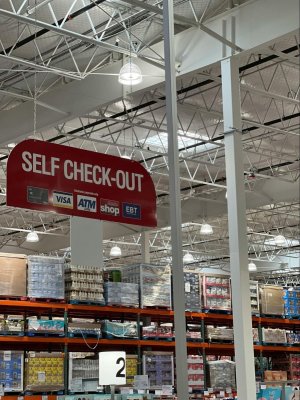Experts are baffled as America's top supermarket ditches self-checkouts – Find out the real reason why they're doing it!
In a surprising twist in the retail world, Hy-Vee, a supermarket chain beloved by many, is phasing out self-checkouts.
This move has left experts scratching their heads, as the company claims it's all in the name of enhancing customer service. But is there more to the story than meets the eye?
The Shift Away from Self-Service
Hy-Vee, with a strong presence in the Midwest and South at 300 stores strong, has been quietly transitioning away from self-checkout kiosks.
In some locations, these have been completely replaced with traditional staffed lanes, while others have introduced express lanes with a 12-item limit for the remaining kiosks.
The official line from Hy-Vee's bosses is that they aim to “provide a better customer experience in several of our stores by bringing back face-to-face interaction with our employees.”
This thought is drawn from the pre-pandemic days when personal touch and human connection were integral to the shopping experience.
The Underlying Concerns: Theft and Efficiency
Despite the customer service angle, retail experts suggest that the real reason for the rollback may be concerns over theft.
Neil Saunders of Global Data points out that “theft rates at self-checkouts are reasonably high,” due to both intentional theft and accidental mistakes by customers.
By directing more shoppers to manned checkouts, retailers can mitigate these issues and potentially save money.
Hy-Vee’s decision follows a trend among major retailers like Target and Walmart, which have also been removing self-checkouts across the country.
The move suggests a broader reevaluation of the self-service model that became popular during the COVID-19 pandemic.
The Backlash Against Self-Checkouts
Self-checkouts were initially introduced as a means to streamline the shopping process, reduce queues, and cut staffing costs. However, they've faced growing criticism from both customers and store staff.
Shoppers often feel they're being asked to do the work of cashiers without compensation, while store managers blame the machines for increased theft, also known as inventory shrinkage.
A USA Today poll that named Hy-Vee the top supermarket also highlighted customer preferences for a more personalized shopping experience. Their popularity for being personal may encourage the shift back to traditional checkouts.
The Bigger Picture: Rethinking Retail Strategies
Hy-Vee’s move to eliminate self-checkouts is part of a larger trend where retailers are rethinking their business strategies to balance efficiency with customer satisfaction.
Iowa State University professor Peter Ralston suggests that self-checkout aisles can lead to more inventory shrinkage, whether through theft or misplacement of items.
The supermarket chain’s decision to end its Scan & Go cashierless checkout app started in 2023, after just two years further indicates a pivot away from self-service technologies.
This change reflects a broader industry trend where the initial enthusiasm for automation is giving way to a renewed appreciation for human interaction.
The Future of Grocery Shopping
As we witness America's top supermarket ditch self-checkouts, it's clear that the future of grocery shopping is still being written.
Retailers are grappling with how to provide the convenience and efficiency that technology offers while maintaining the personal touch that customers value.
For the senior community, this shift might be a welcome return to a more familiar and comfortable shopping experience. Many in our demographic appreciate the personal interaction and assistance that comes with staffed checkouts, especially when managing new technology can sometimes be challenging.
In the end, whether it's a strategic move to reduce theft or a genuine effort to improve customer service, Hy-Vee's decision is a reminder that in the world of retail, the customer's experience is still king.

What are your thoughts on the move away from self-checkouts? Do you prefer the convenience of self-service or the personal touch of a staffed checkout?
Have you noticed these changes in your local stores, and how have they impacted your shopping experience?
Share your insights and experiences in the comments below. Your perspective is invaluable as we navigate the evolving landscape of retail and technology together.
This move has left experts scratching their heads, as the company claims it's all in the name of enhancing customer service. But is there more to the story than meets the eye?
The Shift Away from Self-Service
Hy-Vee, with a strong presence in the Midwest and South at 300 stores strong, has been quietly transitioning away from self-checkout kiosks.
In some locations, these have been completely replaced with traditional staffed lanes, while others have introduced express lanes with a 12-item limit for the remaining kiosks.
The official line from Hy-Vee's bosses is that they aim to “provide a better customer experience in several of our stores by bringing back face-to-face interaction with our employees.”
This thought is drawn from the pre-pandemic days when personal touch and human connection were integral to the shopping experience.
The Underlying Concerns: Theft and Efficiency
Despite the customer service angle, retail experts suggest that the real reason for the rollback may be concerns over theft.
Neil Saunders of Global Data points out that “theft rates at self-checkouts are reasonably high,” due to both intentional theft and accidental mistakes by customers.
By directing more shoppers to manned checkouts, retailers can mitigate these issues and potentially save money.
Hy-Vee’s decision follows a trend among major retailers like Target and Walmart, which have also been removing self-checkouts across the country.
The move suggests a broader reevaluation of the self-service model that became popular during the COVID-19 pandemic.
The Backlash Against Self-Checkouts
Self-checkouts were initially introduced as a means to streamline the shopping process, reduce queues, and cut staffing costs. However, they've faced growing criticism from both customers and store staff.
Shoppers often feel they're being asked to do the work of cashiers without compensation, while store managers blame the machines for increased theft, also known as inventory shrinkage.
A USA Today poll that named Hy-Vee the top supermarket also highlighted customer preferences for a more personalized shopping experience. Their popularity for being personal may encourage the shift back to traditional checkouts.
The Bigger Picture: Rethinking Retail Strategies
Hy-Vee’s move to eliminate self-checkouts is part of a larger trend where retailers are rethinking their business strategies to balance efficiency with customer satisfaction.
Iowa State University professor Peter Ralston suggests that self-checkout aisles can lead to more inventory shrinkage, whether through theft or misplacement of items.
The supermarket chain’s decision to end its Scan & Go cashierless checkout app started in 2023, after just two years further indicates a pivot away from self-service technologies.
This change reflects a broader industry trend where the initial enthusiasm for automation is giving way to a renewed appreciation for human interaction.
The Future of Grocery Shopping
As we witness America's top supermarket ditch self-checkouts, it's clear that the future of grocery shopping is still being written.
Retailers are grappling with how to provide the convenience and efficiency that technology offers while maintaining the personal touch that customers value.
For the senior community, this shift might be a welcome return to a more familiar and comfortable shopping experience. Many in our demographic appreciate the personal interaction and assistance that comes with staffed checkouts, especially when managing new technology can sometimes be challenging.
In the end, whether it's a strategic move to reduce theft or a genuine effort to improve customer service, Hy-Vee's decision is a reminder that in the world of retail, the customer's experience is still king.
Key Takeaways
- Hy-Vee, a US supermarket chain, is removing self-checkouts and bringing back staffed lanes to improve customer experiences and interaction.
- Experts argue the removal of self-checkouts is to reduce theft rates, which tend to be higher at self-service kiosks.
- Although Hy-Vee claims the change is for better customer service, they have also stopped their Scan & Go cashierless checkout app due to similar concerns.
- Other US retailers like Walmart, Target, Dollar General, and Kroger are also taking steps to limit or remove self-checkouts from their stores.
What are your thoughts on the move away from self-checkouts? Do you prefer the convenience of self-service or the personal touch of a staffed checkout?
Have you noticed these changes in your local stores, and how have they impacted your shopping experience?
Share your insights and experiences in the comments below. Your perspective is invaluable as we navigate the evolving landscape of retail and technology together.









